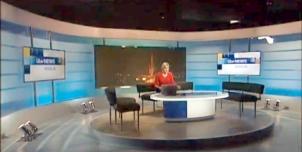Full Freeview on the Tacolneston (Norfolk, England) transmitter
| Google Streetview | Google map | Bing map | Google Earth | 52.518,1.139 or 52°31'6"N 1°8'22"E | NR16 1DW |
The symbol shows the location of the Tacolneston (Norfolk, England) transmitter which serves 330,000 homes. The bright green areas shown where the signal from this transmitter is strong, dark green areas are poorer signals. Those parts shown in yellow may have interference on the same frequency from other masts.
This transmitter has no current reported problems
The BBC and Digital UK report there are no faults or engineering work on the Tacolneston (Norfolk, England) transmitter._______
Digital television services are broadcast on a multiplexes (or Mux) where many stations occupy a single broadcast frequency, as shown below.
64QAM 8K 3/4 27.1Mb/s DVB-T MPEG2
DTG-12 QSPK 8K 3/4 8.0Mb/s DVB-T MPEG2
H/V: aerial position (horizontal or vertical)
Which Freeview channels does the Tacolneston transmitter broadcast?
If you have any kind of Freeview fault, follow this Freeview reset procedure first.Digital television services are broadcast on a multiplexes (or Mux) where many stations occupy a single broadcast frequency, as shown below.
64QAM 8K 3/4 27.1Mb/s DVB-T MPEG2
DTG-12 QSPK 8K 3/4 8.0Mb/s DVB-T MPEG2
H/V: aerial position (horizontal or vertical)
Which BBC and ITV regional news can I watch from the Tacolneston transmitter?

BBC Look East (East) 0.8m homes 3.2%
from Norwich NR2 1BH, 16km northeast (37°)
to BBC East region - 27 masts.
70% of BBC East (East) and BBC East (West) is shared output

ITV Anglia News 0.8m homes 3.2%
from NORWICH NR1 3JG, 16km northeast (38°)
to ITV Anglia (East) region - 26 masts.
All of lunch, weekend and 80% evening news is shared with Anglia (West)
Are there any self-help relays?
| Gt Yarmouth | Transposer | 1 km S town centre | 30 homes |
| Lowestoft (2) | Transposer | Rotterdam Rd | 125 homes |
How will the Tacolneston (Norfolk, England) transmission frequencies change over time?
| 1950s-80s | 1984-97 | 1997-98 | 1998-2011 | 2011-13 | 2013-18 | 2013-17 | 17 Jul 2018 | ||
| VHF | C/D E | C/D E | C/D E | E | E T | W T | W T | ||
| C3 | BBCtvwaves | ||||||||
| C31 | com7 | com7 | |||||||
| C32 | _local | ||||||||
| C37 | com8 | com8 | |||||||
| C39 | +ArqB | +ArqB | ArqB | ||||||
| C40 | BBCA | ||||||||
| C42 | SDN | SDN | SDN | SDN | |||||
| C43 | D3+4 | ||||||||
| C45 | ArqA | ArqA | ArqA | ArqA | |||||
| C46 | BBCB | ||||||||
| C50tv_off | BBCB | BBCB | |||||||
| C52tv_off | C5waves | C5waves | |||||||
| C55tv_off | BBC2waves | BBC2waves | BBC2waves | -BBCA | -BBCA | -BBCA | com7tv_off | ||
| C56tv_off | COM8tv_off | ||||||||
| C57tv_off | LNR | LNR | |||||||
| C59tv_off | ITVwaves | ITVwaves | ITVwaves | -D3+4 | -D3+4 | -D3+4 | |||
| C62 | BBC1waves | BBC1waves | BBC1waves | BBCB | |||||
| C65 | C4waves | C4waves | C4waves |
tv_off Being removed from Freeview (for 5G use) after November 2020 / June 2022 - more
Table shows multiplexes names see this article;
green background for transmission frequencies
Notes: + and - denote 166kHz offset; aerial group are shown as A B C/D E K W T
waves denotes analogue; digital switchover was 9 Nov 11 and 23 Nov 11.
How do the old analogue and currrent digital signal levels compare?
| Analogue 1-4 | 250kW | |
| SDN, ARQA, ARQB, BBCA, D3+4, BBCB | (-4dB) 100kW | |
| com7 | (-9.6dB) 27.4kW | |
| com8 | (-10.2dB) 24kW | |
| Mux 1*, Mux 2*, LNR | (-14dB) 10kW | |
| Mux A*, Mux B*, Mux C*, Mux D* | (-17dB) 5kW | |
| Analogue 5 | (-18dB) 4kW |
Local transmitter maps
Tacolneston Freeview Tacolneston DAB Tacolneston TV region BBC East Anglia (East micro region)Which companies have run the Channel 3 services in the Tacolneston transmitter area
|
|
Saturday, 5 February 2011
J
jh4:45 PM
Lowestoft
Ive had quality = 1 levels for digital BBC1 and 2 for the past week, not watchable - it this the transmitter? Its not occasional. thanks (5/feb) post code nR33 7qz jh
| link to this comment |
jh's: ...
jh: You don't seem to be in an "offical" Freeview reception area yet. And even after switchover, on 23rd November 2011 you are still not predicted to have excellent reception, other than on Multiplex PSB1.
The transmitter has no faults.
There is currently weather conditions causing Inversion, see What is the Inversion Effect and why does it effect my Freeview TV reception?
| ukfree.tv - independent free digital TV advice .
To be honest, you would be best switching to Freesat.
| link to this comment |
Sunday, 6 February 2011
R
Richard Baguley8:01 PM
North Walsham
Thanks for your comments. What you say is exactly what I understood to be the case - a big increase in transmitter power and one that should improve reception for us bog dwellers enormously.
Haven't looked at your ss map again but shall do later.
Again, many thanks.
| link to this comment |
Richard's: mapR's Freeview map terrainR's terrain plot wavesR's frequency data R's Freeview Detailed Coverage
Richard Baguley: I'm glad to have set your mind at rest.
| link to this comment |
Monday, 7 February 2011
R
Richard Baguley1:18 PM
North Walsham
You certainly did!
I note the ss map hasn't, yet, been updated (it still shows a fall in strength post DSO so shall take another look later; ITM, the numbers you supplied do the job.
| link to this comment |
Richard's: mapR's Freeview map terrainR's terrain plot wavesR's frequency data R's Freeview Detailed Coverage
Richard Baguley: Sorry, I haven't yet had the opportunity to redo the code for the page.
| link to this comment |
M
Mike Dimmick2:30 PM
Reading
Brian: why don't you just remove the erroneous NEW7 and NEW8?
There is no date even set for interleaved spectrum auctions. There is no guarantee that the spectrum auction will be won by any TV provider. The speculative allocations - and they were only ever suggestions - will have to be completely redone, since channels 61 and 62 are now to be released for mobile phone use. Previous allocations of 61 and 62 - either to existing muxes or tentative interleaved allocations - are planned to be moved to 49 and 50, and 49 and 50 to 39 and 40. However, some transmitters that haven't yet switched and currently use C39 or C40 for an analogue service are now to use that channel for a post-switchover digital service, according to Ofcom's latest documents.
NEW7 and NEW8 are causing problems on a number of transmitter pages where a real mux is temporarily allocated to those frequencies (e.g. Mendip). It's also sowing confusion among users expecting new services to launch at switchover.
I suggest removing NEW7 and NEW8 until we know what is actually going to happen - probably not for another two years unless Mr Hunt tries to push through his local TV proposals sooner (which will cause chaos, but politicians aren't known for their understanding of technical issues).
| link to this comment |
Mike's: mapM's Freeview map terrainM's terrain plot wavesM's frequency data M's Freeview Detailed Coverage
Mike Dimmick: They are no "erroneous". They will be used for the Local TV services currently proposed by the Culture Secretary and for which there is now at least a single bid, with the services due to start in the next few years.
| link to this comment |
Saturday, 12 February 2011
P
ParishPete4:46 PM
I live in NR20. Is it anticipated that any pre switchover tests of HD transmission will take place prior to November?
| link to this comment |
M
Mike Dimmick5:51 PM
ParishPete: No. There are no free frequencies to launch any new multiplexes, and there's really no time to plan anything at this point - particularly with having built an entirely new transmitting mast at Tacolneston.
Considering that several TV regions have already switched over and launched HD services, there's really nothing to test - particularly since the HD services are taking over BBC One's current analogue frequency.
The switchover programme is complicated, with lots of dependencies between sites. If power is increased or a new service added at one site, it causes additional interference for viewers using another site. Some sites have to have some early retunes in order to free up frequencies for other sites to use, and those sites are farther apart than you might think. The Waltham transmitter near Melton Mowbray will change frequencies twice, for two different multiplexes, at the end of March and mid-April, in order to free up frequencies for The Wrekin transmitter (between Telford and Shrewsbury, about 75 miles away) to start using a week later.
| link to this comment |
Select more comments
Your comment please!





